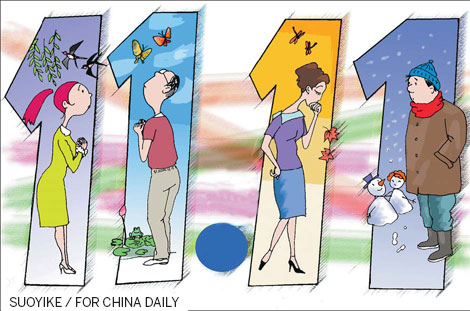
Today, 2011-11-11 as many Chinese notate the date, bachelors in China have two more reasons to celebrate or bemoan their fate - or, rather, two more sticks.
To find out why, you'd have to know the story of Guanggun Festival. Guanggun, in Chinese, refers to an adult single, usually male and often reluctantly unattached.
Literally, it means a stick that is unvarnished or does not have any covering. As the Arabic numeral 1, looks like an erect stick, it has come to symbolize this status of unwilling celibacy.
Nov 11, written in numerals as is the Chinese norm, offers four consecutive 1s, and, therefore, has evolved over a decade to become an occasion for grassroots celebration. This year, it is preceded by two extra 1s in the year 2011, as the Chinese order for dates lists year first, and then the month and the day.
If the government recognized this day as a holiday, rest assured there would be six giant poles sticking out of Tian'anmen Square.
For those of you with Freudian flights of fancy, you have guessed right: Guanggun does contain a not-so-subtle phallic connotation, as with many folksy terms of this nature.
However, few are aware of this etymological naughtiness, which has been washed out from overuse. Even the most hidebound would not hesitate using the word in their daily conversation.
But you may not hear it on television news.
Guanggun is self-deprecating in tone. And the Guanggun Festival is marked by those who call attention to their eligibility and yet are not proud of it.
Rather, it could be an indirect appeal to the fair sex for courting. It is inconceivable for a middle-aged guy who has resisted all pressures to tie the knot to participate in this kind of college-oriented romp.
Rumor has it that the Guanggun Festival has its origin on a university campus in Nanjing. Four male students were playing mahjong, and strangely they all won on the tile "four bamboos". Later, they realized that they played from 11 am to 11 pm and it happened to be Nov 11 Well, the coincidences just added up - or perhaps were made up - but nobody was bothered by it.

The most common way to commemorate the day is to throw a stag party. With alcohol flowing, participants recount past romances and future promises.
Some lament the loves lost while others take the chance to display bravado by, say, challenging the guy who stole away his girl.
Most of these threats never come to fruition, as they serve as a safe outlet for both pent-up hormones and frustrations.
Many use the occasion to pledge to themselves - and their drinking buddies - that they will end their unfettered standing in the coming year. They will actively seek out dates.
At least one guy has reported receiving a card from a girl wishing him, "no pleasure at all on this day".
He asked why and was given the explanation: "Because starting from today you're no longer unattached."
Like the holiday itself, this may be a joke on the joker himself.
There is a term called "tuo guang" that is hot around this time. Literally, it means, "stripping naked", but it is actually short for "removing the stigma of being companionless". According to reports, the pun has galvanized some to streak - mostly in their dormitories with windows shut, though.
Retailers love holidays, and even an unofficial one like this has not escaped their promotional fervor.
Anything that looks like a stick, such as fried dough sticks or candy canes, are said to be popular.
Some use the sugarcoated haws on a stick, which is a local snack sold on streets in North China, to show off their determination to find a spouse - by quickly eating up all the haws, a visual pun for "tuo guang" that logically should mean the opposite: turning from attachment to bachelorhood.
The Guanggun Festival is still evolving as it gains more trappings of tradition and urban mythology.
With tens of millions of young men projected to join the ranks of the haplessly single and with the daunting task of a marriage proposal that makes property ownership a prerequisite, the bachelor party in a nation of 1.3 billion can get only larger and rowdier.
There are already complaints that one day a year is not enough to tout one's forced singleness. Jan 1, or 1-1, is added as a mini-festival. And Jan 11 and Nov 1, or 1-11 and 11-1, are considered medium-level ones that lead up to the grand day.
The country's family planning officers must be laughing up their sleeves.
raymondzhou@chinadaily.com.cn
相關(guān)閱讀:
What's love got to do with it?
Something's funny about the bunny
(作者周黎明 中國(guó)日?qǐng)?bào)網(wǎng)英語(yǔ)點(diǎn)津 編輯陳丹妮)
